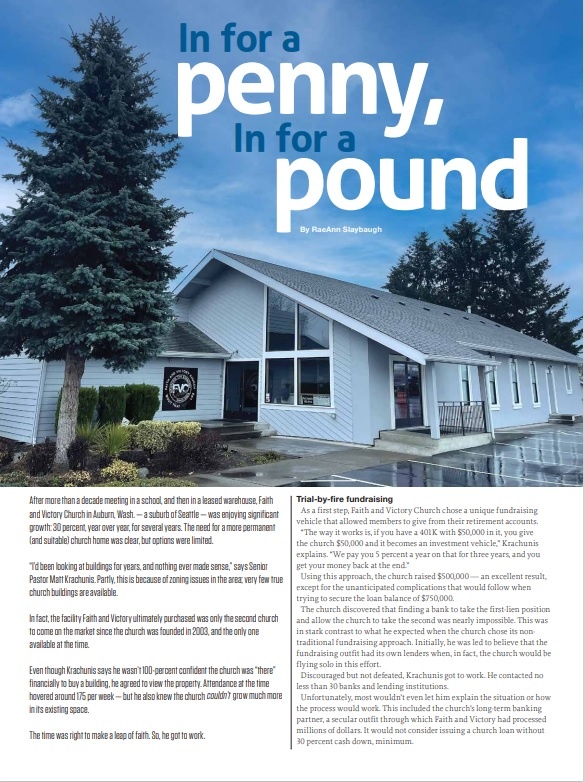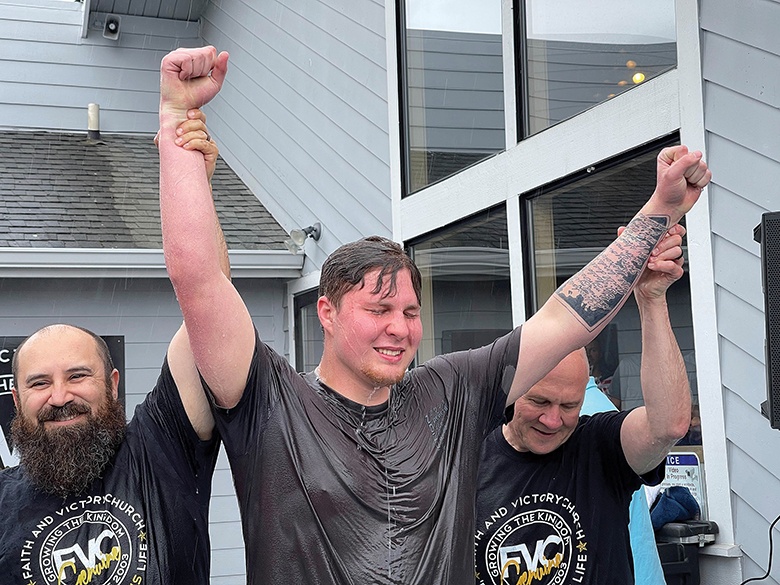
By RaeAnn Slaybaugh
After more than a decade meeting in a school, and then in a leased warehouse, Faith and Victory Church in Auburn, Wash. — a suburb of Seattle — was enjoying significant growth: 30 percent, year over year, for several years. The need for a more permanent (and suitable) church home was clear, but options were limited.
“I’d been looking at buildings for years, and nothing ever made sense,” says Senior Pastor Matt Krachunis. Partly, this is because of zoning issues in the area; very few true church buildings are available.
In fact, the facility Faith and Victory ultimately purchased was only the second church to come on the market since the church was founded in 2003, and the only one available at the time.
Even though Krachunis says he wasn’t 100-percent confident the church was “there” financially to buy a building, he agreed to view the property. Attendance at the time hovered around 175 per week — but he also knew the church couldn’t grow much more in its existing space.
The time was right to make a leap of faith. So, he got to work.

Trial-by-fire fundraising
As a first step, Faith and Victory Church chose a unique fundraising vehicle that allowed members to give from their retirement accounts.
“The way it works is, if you have a 401K with $50,000 in it, you give the church $50,000 and it becomes an investment vehicle,” Krachunis explains. “We pay you 5 percent a year on that for three years, and you get your money back at the end.”
Using this approach, the church raised $500,000 — an excellent result, except for the unanticipated complications that would follow when trying to secure the loan balance of $750,000.

The church discovered that finding a bank to take the first-lien position and allow the church to take the second was nearly impossible. This was in stark contrast to what he expected when the church chose its non-traditional fundraising approach. Initially, he was led to believe that the fundraising outfit had its own lenders when, in fact, the church would be flying solo in this effort.
Discouraged but not defeated, Krachunis got to work. He contacted no less than 30 banks and lending institutions.
Unfortunately, most wouldn’t even let him explain the situation or how the process would work. This included the church’s long-term banking partner, a secular outfit through which Faith and Victory had processed millions of dollars. It would not consider issuing a church loan without 30 percent cash down, minimum.
“I was just dealing with a branch manager, and I couldn’t get to anybody else,” Krachunis recalls. “Even local banks that I walked into — every loan agent and every mortgage broker — just said no. They said, ‘If it’s not hard cash, we’re not interested.’”
Crippling concern set in, but Krachunis pressed on. He had 45 days to secure funding, or the church would lose its opportunity to buy the building.
“All I did for a month was just dial the phone,” he recalls. “I would get up in the morning, get on the internet, just dial, dial, dial, dial. Discouragement, discouragement, discouragement” — until he met Charity Kuehn, Vice President of Church Financing at Union Bank & Trust (UBT).
“To this day, I don’t know how I found her, specifically,” Krachunis says. “But she picked up the phone and said, ‘Hi, this is, Charity,’ and I said, ‘I sure hope it is.’ And she laughed.”
Krachunis explained the church’s position and its needs. He was shocked by Kuehn’s reply: “This is interesting. Tell me more.”
For context, it is important to note that this was the church’s first-ever financing effort. For 11 years, it had never sought a loan — not for a vehicle, nor sound equipment, nothing. It paid cash for all expenses, and the rest went into savings. So, while not much was known about securing a loan, Faith and Victory did have excellent records of finances and attendance.
This spoke volumes to UBT, as did the absence of any existing debt — critical information, because orchestrating such a unique financing structure was a first for the bank as well.
“UBT actually listened to our situation and looked at our growth curve of our attendance and giving,” Krachunis says. “Ultimately, they realized that we could handle the financial obligations of a loan.”

An excellent investment
As it turns out, the church not only met its loan obligations but exceeded them.
The retirement savings-fueled fundraising model it used in the beginning had a five-year term, but the church was able to pay back its investors (members) within two years. This was thanks to the equity gained in the property, plus an increase in giving.
Now, the main building is paid off, and Faith and Victory has added four residential properties to its footprint over the past five years. All have been financed by UBT, and one residential property is already paid off. In the coming years, church leaders plan to add three more properties as they become available. Then, it will own the entire block.
It’s a unique expansion model, but a necessary one in Auburn, where land on which to expand is virtually non-existent. In order to grow, Faith and Victory must purchase surrounding properties, all of which are occupied by homes.
“As the Lord leads, if we need to create more parking or we want to build a new building, we’re just buying up acreage piecemeal instead of trying to find two acres here or three acres there,” he explains.
As a bonus, this expansion model not only meets future needs, but also current ones. The youth pastor lives in one home, for example, and a school is being operated in another. Properties are being optimized for ministry use and even to generate unrelated business income.
20/20 hindsight
In navigating this financing challenge, Krachunis says he learned a lot. First, that the church will never again do crowdfunding. Second, that expansion simply requires funding.
“Spiritually speaking, it’s important to know that the initial $1.2 million was huge; I’d never dealt with a number that big in my entire life,” he emphasizes. “Now, seven years later, numbers don’t bother me anymore.”
Granted, it took a leap of faith to get here — but there are no regrets.
“There’s always going to be a point where you have to give it all; you’ve got to swing for the fences,” he advises. “That was our moment.”


